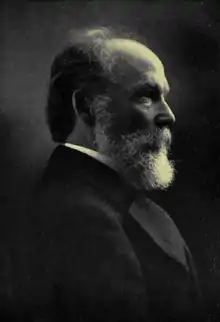
Moses Coit Tyler (August 2, 1835 – December 28, 1900) was an American author and the first full university professor of American history.
Biography
He was born Moses Tyler in Griswold, Connecticut. In his childhood, his family moved several times to Constantia, New York, and several locations in Michigan, settling in Detroit in 1842. In Detroit he attended First Congregational Church.[1] In 1850, at the age of 15 he became a schoolteacher in Romeo, Michigan. The next year he became a bookseller in Chicago.[1]
He entered the University of Michigan in 1852. The next year, a relative from Connecticut financed his transfer to Yale University. He graduated A.B. in 1857 and A.M. in 1863. During his senior year, he met Andrew Dickson White at a Skull and Bones[2] meeting. This became a lifelong personal and professional friendship.
He studied for the Congregational ministry at the Yale Divinity School (1857–1858) and at the Andover Theological Seminary (1858–1859). His first pastorate was at a Congregationalist church in Owego, New York from 1859 to 1860. In 1861 he moved to a larger congregation in Poughkeepsie.[1]
In 1862 he suffered a nervous breakdown. To recover he attended Boston's Normal Institute for Physical Education for six months, where he became a disciple of Diocletian Lewis and his calisthenic training regimens. After recovery, he settled in England and established himself as a lecturer and essayist; initially as an evangelist for Lewis' musical gymnastics, but transitioning to studying and contrasting American and British society.[1]
In 1867 he became professor of English language and literature at the University of Michigan. He held that position until 1881,[3] except in 1873-1874 when he was literary editor of The Christian Union. His disgust with the Henry Ward Beecher Beecher-Tilton Scandal case sent him back to Michigan. Tyler was elected a member of the American Antiquarian Society in 1879.[4]
For much of the 1870s, Andrew Dickson White had been promoting the study of American history at Cornell University, having hired George Washington Greene, William C. Russell, Hermann E. Von Holst, and John Fiske in various roles as visiting professors and lecturers. In 1881, White secured funds for a permanent professorship, and hired his old college friend Tyler. Tyler turned down a competing offer from Columbia University (at double the pay). From 1881 until his death, he was professor of American history and chairman of the Department of History. This was the first full professorship of American history.[1]
In 1881 he was ordained deacon in the Protestant Episcopal Church and in 1883 priest, but he never undertook regular parochial work.[1]
Work
Beginning with his first stay in England in the 1860s, Tyler advocated for establishing formal studies of American literature and history. At the University of Michigan, while employed as an English professor, he proposed American literature and history be added to the curriculum. He was self-taught as a historian, and placed high importance on collection and use of primary sources, including
After noting that White and Cornell had arranged for George Washington Greene to be a visiting professor of American history in the early 1870s, he wrote a series of letters to Andrew White and Benson Lossing on the subject, and proposing himself as a permanent professor of American history at Cornell. Cornell's recent acquisition of Jared Sparks' library made Cornell a desirable institution for the aspiring American historian.[1]
Most important among his works are his valuable and original History of American Literature during the Colonial Time, 1607-1765 (2 vols, 1878; revised in 1897), and Literary History of the American Revolution, 1763-1783 (2 vols, 1897). Supplementary to these two is his Three Men of Letters (1895), containing biographical and critical chapters on George Berkeley, Timothy Dwight and Joel Barlow.
In addition he published:
- The Brawnville Papers (1869), a series of essays on physical culture
- a revision of Henry Morley's Manual of English Literature (1879)
- Christianity and Manliness (1885), essay
- In Memoriam: Edgar Kelsey Apgar (1886), privately printed
- Patrick Henry (1887), a biography in the "American Statesmen" series
- Glimpses of England; Social, Political, Literary (1898), a selection from his sketches written while abroad.
Among his students at Cornell were Charles Hull (who succeeded him at Cornell as Professor of American History) and Charles A. Beard.
His papers are archived at the Cornell University Library.[5] Selections were published by his daughter in 1911.[6]
Personal life
In 1862, at the request of his cousin, Dr. Daniel T. Coit of Boston, he adopted the name "Coit" as his middle name.
He married Jeannette Gilbert of New Haven, and had three children: Jessica, Edward, and Ned. He spent many professional years and holidays away from them.[1]
Legacy
Tyler House, located within the East Quad dormitory on the Central Campus of the University of Michigan, is named in his honor.[7]
References
- 1 2 3 4 5 6 7 8 Kammen, Michael (1983). "Moses Coit Tyler: The First Professor of American History in the United States". The History Teacher. 17 (1): 61–87. doi:10.2307/493223. ISSN 0018-2745. JSTOR 493223.
- ↑ Kammen, Michael G. (1989). Selvages and Biases: The Fabric of History in American Culture. Cornell University Press. p. 223. ISBN 0801494044.
- ↑ "PROF. MOSES COIT TYLER.; HIS LETTER RESIGNING HIS CHAIR IN THE UNIVERSITY OF MICHIGAN TO ACCEPT THAT AT CORNELL". The New York Times. Retrieved 2023-04-29.
- ↑ American Antiquarian Society Members Directory
- ↑ "Guide to the Moses Coit Tyler collection, 1779-1900-(bulk 1850-1900)". rmc.library.cornell.edu. Retrieved 2023-03-01.
- ↑ Tyler, Moses Coit (1911). Austen, Jessica Tyler (ed.). Moses Coit Tyler, 1835-1900; Selections from his Letters and DIaries. Garden City, New York: Doubleday.
- ↑ "The Residence Halls | U-M LSA Residential College". lsa.umich.edu. Retrieved 2023-09-19.
External links
- Moses Coit Tyler on Encyclopaeida Britannica
- Moses Coit Tyler on LocalWiki
- Beach, Chandler B., ed. (1914). . . Chicago: F. E. Compton and Co.
- Works by Moses Coit Tyler at Project Gutenberg
- Works by or about Moses Coit Tyler at Internet Archive